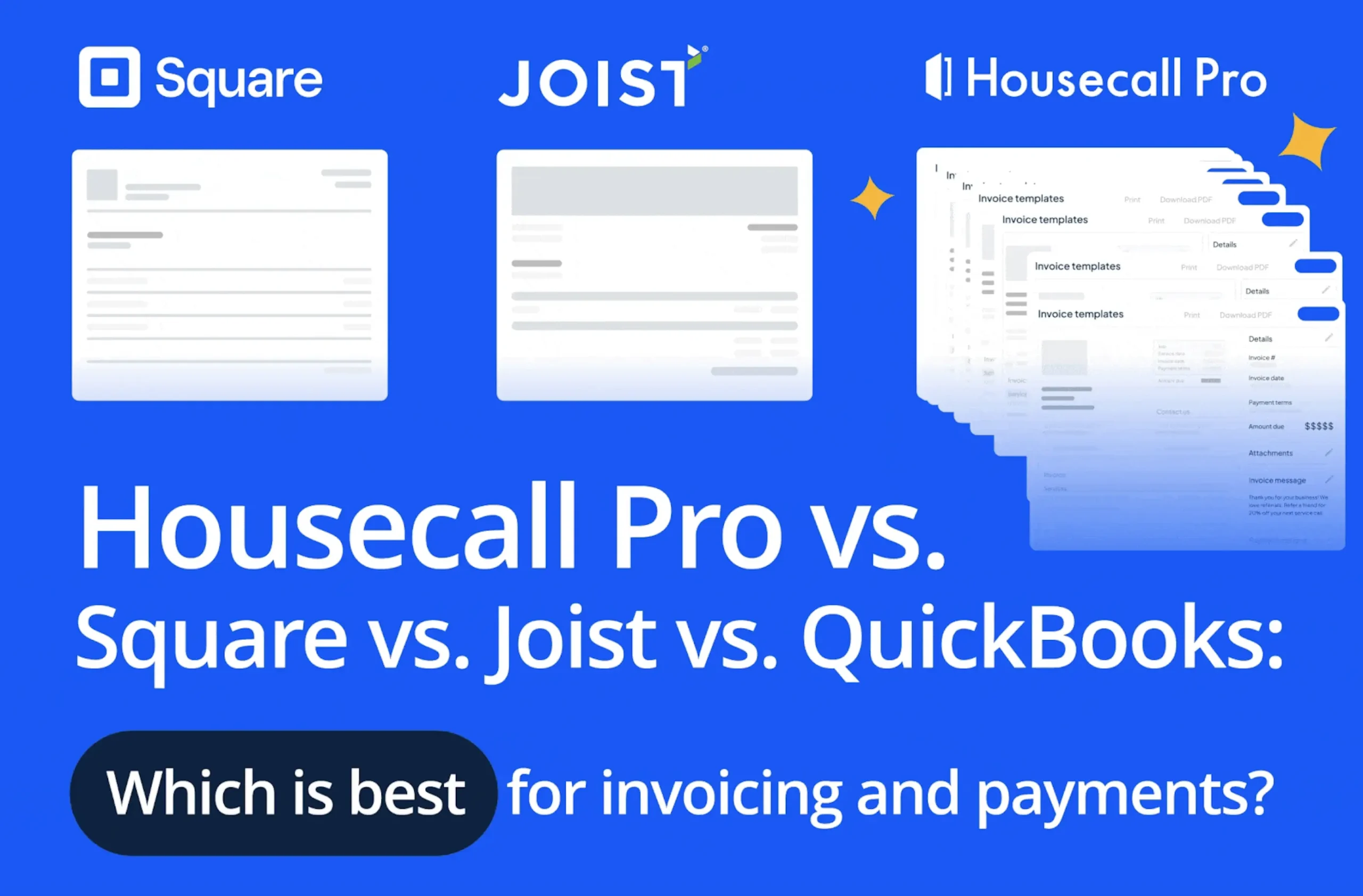
As a home service business owner, you need all the help you can get. Sometimes that quite literally means hiring help. The key is to understand the employment relationship—whether you need an employee or an independent contractor—and what it means for you as a business owner.
Read on to learn about the differences between contractors and employees, when it is beneficial to consider one over the other, and more. Let’s break down everything you need to know to make the best decision for your business.
Who is a Contractor?
When considering subcontractor vs. employee, it helps to know what each is. A contractor is a self-employed individual who provides services to a client, often under an independent contractor agreement. Subcontractors can sometimes be a business or agency that handles temporary or specialized services as well.
Contractors manage their own workload and taxation requirements. They may even operate as a separate business entity and hire subcontractors or employees of their own to handle projects.
What is a Subcontractor?
Subcontractors are individual workers with specialized skills that your business doesn’t already have. They operate under an independent contractor relationship and are typically hired for specific, short-term tasks.
Subcontractor vs. employee pros and cons often guide business owners in deciding which option fits their needs. Subcontractors excel at handling niche or seasonal projects without requiring the commitment of a permanent hire.
When Subcontractors Are a Great Fit
Subcontractors are ideal for short-term projects or seasonal work. They don’t become part of your team’s employment relationship but are brought on temporarily to address spikes in demand or specialized tasks.
For instance, an HVAC business might hire a subcontractor for specialized services, while a landscaping company may bring one on during busy summer months to manage the workload.
What is an Employee?
An employee is someone hired directly by your business with a set schedule and responsibilities. Unlike subcontractors, employees work as part of your employment relationship, contributing to the company’s culture and long-term goals.
Employees are typically eligible for overtime wages and other benefits like health insurance and paid time off, which are not usually provided to subcontractors.
When You Need Employees
Employees are better suited for daily, ongoing tasks. Roles such as dispatchers, administrative staff, or full-time technicians fall under the proper classification as employees. These individuals are integral to your company’s operations and provide consistency in work.
What are the Key Differences Between Hiring Subcontractors vs. Employees?
Still not sure whether you are looking at when considering an employee vs. subcontractor? Let’s take a closer look by breaking the parameters down in the table below:
| Subcontractors | Employees | |
| Project Duration | Short-term, specific projects | Long-term, ongoing work |
| Work Schedule | Flexible, self-determined | Set by employer, typically fixed |
| Expertise | Specialized skills, minimal training needed | May require training and development |
| Relationship | Business-to-business, temporary | Permanent, part of company structure |
| Resource Provision | Provide own tools and equipment | Company provides necessary resources |
| Benefits | No benefits package | Often receive comprehensive employee benefits |
| Tax Responsibility | Self-employed, responsible for own taxes | Taxes withheld by employer |
| Work Availability | May have gaps between projects | Consistent work as long as employed |
| Control | High autonomy in how work is completed | Work under company’s direction |
| Cost Structure | Project-based payments | Minimum wage with regular salary plus benefits |
| Legal Classification | Subject to contractor regulations | Protected by employment laws |
When Should You Hire Subcontractors vs. Employees?
Hiring subcontractors versus employees is a critical decision for field service business owners, as it directly impacts your operations, costs, and compliance. To make the right choice, consider factors like workload, project needs, and legal implications. Here’s a breakdown to help you decide when to hire subcontractors versus employees.
When to Hire Subcontractors
Subcontractors, or independent contractors, are ideal when you need specialized skills or flexible labor for short-term or specific projects. Here’s when subcontractors might be the better choice:
1. Seasonal or Short-Term Projects
If your workload fluctuates or you have long-term projects requiring specialized expertise for a limited time, hiring subcontractors can help scale your workforce without committing to long-term costs.
2. Specialized Skill Sets
Subcontractors bring unique skill sets that may not be available in-house. For instance, you might hire a contractor for HVAC installation expertise or advanced landscaping design.
3. Reduced Administrative Burden
Subcontractors are responsible for their own taxes, tools, and business costs, minimizing your administrative overhead. You don’t provide benefits or manage day-to-day behavioral control, which reduces compliance complexity.
4. Cost-Effective for Specific Tasks
Paying subcontractors per project or per task, under agreed-upon payment terms, can be more cost-effective than providing regular salaries and benefits.
When to Hire Employees
Employees are a better choice when you need a dedicated, loyal workforce to support your business long-term. Here’s when employees might be the better fit:
1. Consistent Workload
If your business has a steady flow of work, hiring employees ensures reliable availability. A single employer relationship allows you to build a dependable team for recurring tasks.
2. Control and Training
For tasks requiring significant behavioral control—like adhering to specific company processes or standards—employees are more suitable. Employees can also receive training to align with your business’s goals.
3. Customer Relationships
Employees are more invested in your business, fostering stronger relationships with customers. Subcontractors, as part of their independent business, may have less commitment to your brand’s reputation.
4. Compliance and Risk Mitigation
Hiring employees eliminates the risks associated with worker misclassification. Employees are covered under your insurance policy and receive benefits, which can attract higher-quality talent.
Subcontractor vs. Employee Pros and Cons
The easiest way to see whether it is better to hire a subcontractor or an employee is to see a side-by-side comparison. One pro that comes with hiring employees is that you have better financial control over projects as opposed to subcontractors which are known to be hard to negotiate with. Some pros with subcontractors is that your business benefits Let’s take a deeper look at the pros and cons of hiring a subcontractor vs. an employee.
Benefits of Hiring Subcontractors
| Subcontractor Pros and Cons | Details |
| Pros | |
| Flexibility in Contract Relationship | Subcontractors operate under an independent contractor status, ideal for fluctuating workloads or seasonal projects. |
| Reduced Business Costs | Subcontractors manage their own business assets and insurance policy, reducing your overhead costs. |
| Diverse Skill Sets | Subcontractors bring specialized skills, enabling you to take on niche or high-demand jobs. |
| Opportunity for Profit | Outsourcing tasks frees up resources, potentially increasing profit margins. |
| Cons | |
| Limited Behavioral Control | You have less oversight over work processes due to their independent business setup. |
| Short-Term Business Relationship | Subcontractors may prioritize other clients, as they are not tied exclusively to your business. |
| Complex Payment Terms | Negotiating and managing payment terms can lead to potential delays or misunderstandings. |
Benefits of Hiring Employees
| Employee Pros and Cons | Details |
| Pros | |
| Consistency and Loyalty | Employees work exclusively for your business, fostering stable, long-term relationships. |
| Greater Behavioral Control | You have direct oversight, ensuring tasks are completed according to your standards. |
| Benefits to Employees | Perks like health insurance and retirement plans improve satisfaction and loyalty. |
| Aligned Insurance Policy | Employees are covered under your company’s insurance, providing liability protection. |
| Cons | |
| Higher Business Costs | Payroll taxes, benefits, and business assets add significant costs to your budget. |
| Limited Opportunity for Profit | Higher costs can reduce profit margins, especially during slower business periods. |
| Department of Labor Regulations | Employees require compliance with strict wage, overtime, and other labor laws. |
Tax Differences Between Employees vs Subcontractors
One of the trickiest aspects of the process is knowing what IRS subcontractor vs. employee implications there are. Knowing how to properly classify them means paying the appropriate taxes for one versus the other.
Failing to pay those federal employment taxes, or misclassifying IRS subcontractor vs. employee can lead to some serious fines and penalties. If you aren’t sure how to handle these things, talking to a certified public accountant can be a great place to start.
Taxes You Pay for Employees
Though you control the hiring and firing of an employee, you are responsible for paying taxes related to their employment. That means withholding for income tax, FICA taxes, unemployment benefits, and other fees.
Subcontractors Handle Their Taxes
While you may not have a subcontractor around for the long haul, there is one benefit and that is not having to deal with tax withholding. Subcontractors handle their own self-employment taxes, meaning one less thing you have to address.
What You Should Know About Employee Misclassification
Employee misclassification occurs when a worker is incorrectly labeled as an independent contractor instead of an employee. This distinction is crucial because it determines the worker’s rights, benefits, and tax obligations, as well as the employer’s responsibilities.
Misclassification typically happens when businesses label workers as contractors to avoid costs associated with employees, such as payroll taxes, workers’ compensation, unemployment insurance, and benefits like health coverage.
Legal Pitfalls of Misclassified Workers
There are also the legal aspects of hiring a subcontractor vs. an employee. We touched briefly on the tax implications, but they bear talking about again. Failing to pay taxes or misclassifying can lead to some serious penalties, fines, and even the payment of back taxes from your company.
1. Wage and Hour Violations
Misclassified employees may not receive benefits like overtime pay, minimum wage, or proper breaks. Violating these protections can lead to lawsuits, back pay obligations, and penalties enforced by the Department of Labor (DOL).
2. Tax Liabilities
If a worker is misclassified, your business may avoid payroll taxes. However, the IRS can impose steep fines, including unpaid payroll taxes, interest, and penalties, for improperly withholding Social Security and Medicare contributions.
3. Benefits Denial Issues
Misclassified workers don’t receive employee benefits like health insurance, paid leave, or retirement plans. If the classification is challenged, you may be required to retroactively provide these benefits, adding substantial costs.
4. Workers’ Compensation and Unemployment Insurance
Employers must cover employees under workers’ compensation and unemployment insurance. Misclassified workers could sue for coverage in case of injury or unemployment, leading to costly legal battles and retroactive premiums.
5. Fines and Penalties
Federal and state governments impose severe fines for misclassification. For instance, the Department of Labor or state labor agencies can enforce penalties, even for unintentional mistakes.
6. Loss of Trust and Reputation
Public scrutiny of misclassification scandals can damage your business’s reputation, reducing trust among clients and potential workers.
How to Avoid Employee Misclassification
To avoid legal issues, make sure that roles have been clearly defined and all agreements are in writing. If you are unclear about the classification of an employee vs. subcontractor, talk to a lawyer before making a move. Here’s what you can do to protect your business:
- Understand Classification Criteria: Use the IRS’s “common law test” or consult the DOL’s guidelines to ensure the correct classification. Pay close attention to behavioral control, financial risk, and the nature of the worker’s role.
- Review Worker Agreements: Ensure contracts explicitly state the worker’s role as either an independent contractor or employee, including terms that reflect the nature of the work relationship.
- Stay Updated on Regulations: Labor laws regarding the classification of employees frequently change. Regularly review state and federal requirements to remain compliant.
- Use Tools to Stay Organized: Business management platforms like Housecall Pro help track and manage worker relationships, ensuring compliance with classification guidelines. From generating detailed contracts to organizing payroll and taxes, such tools minimize risks.
Employee vs. Subcontractor Cost Comparison
Each side comes with its own costs. Employees require salaries, training, equipment, and health insurance benefits. They also tend to be around a lot more often, though their schedules and availability can be dictated by the company itself.
Subcontractors, meanwhile, have per-project fees. These are often higher than the per-hour pay that an employee has but with shorter schedules and availability. The more specialized the work, the more costly a subcontractor will be.
Hidden Costs of Each Option
There are additional costs for each that you may not be aware of. For instance, employees have insurance costs, plus paid time off. There is also the chance of worker’s compensation cases needing to be paid out.
As for subcontractors, you aren’t going to be stuck paying time off or insurance, but their rates are far higher. Remember, you are paying for specialized skills in order to complete the task. That time and experience comes at a cost.
Grab a copy: Everything you need to know about workers’ compensation
Make the Right Choice for Your Business
In the debate between subcontractors and employees, each has its benefits. A subcontractor is great if you need a task done and don’t want the long-term requirements of an employee. An employee is great when you need someone there for the day-to-day operations.
It is critical to classify them properly for two reasons. For one, your business should get the right person for the job. For two, you can avoid a lot of trouble from a tax standpoint by classifying your workers properly.
When making the right choice, it is important to consider your long-term goals and your company’s growth strategy. It may be more beneficial to hire subcontractors in the short-term in order to maximize your budget or it may be a better choice to have a dedicated staff on hand. It all depends on your business, its needs, budget, and goals for the future. With this guide, you can make the right choice to suit your business in the best way possible.






